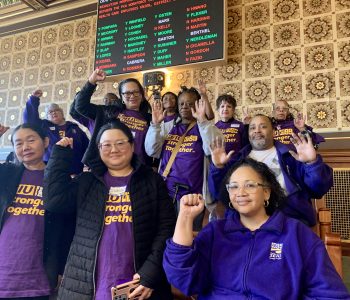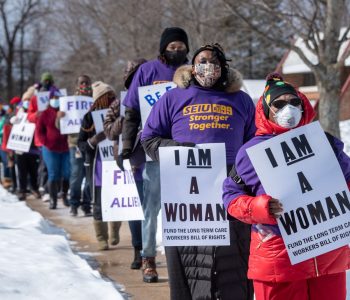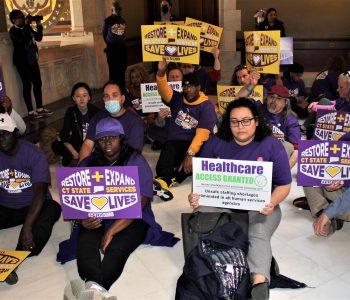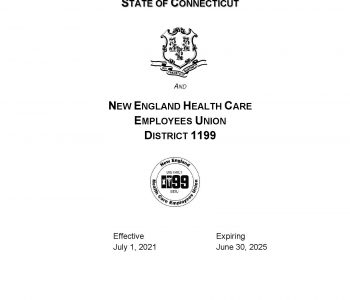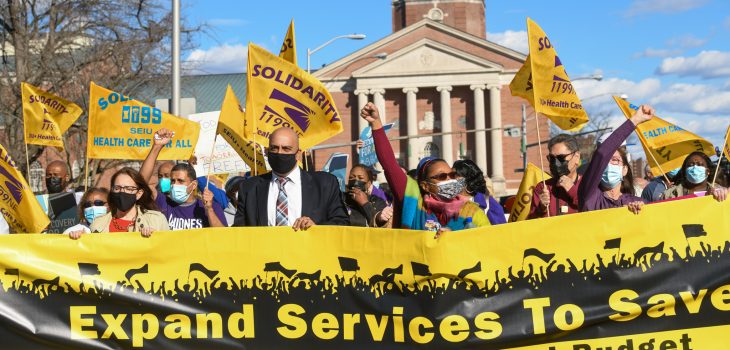 Featured Post
Featured Post
Over 200 state healthcare workers, community partners and elected officials marched in Hartford to commemorate the 53rd anniversary of Dr. Martin Luther King’s assassination and to demand the expansion of state services to meet the growing need of residents and communities all across Connecticut.
Workers engaged in a “March for a Moral Budget” down Capitol Avenue on Tuesday demanding new public investments in the biennial budget to rebuild Connecticut’s healthcare and mental health infrastructure, and other critical areas of urgent direct service.
“Here we are today, five decades after Dr. King’s assassination still determined to gain our rightful place in God’s world. We’re still struggling to eradicate systemic racism, still fighting for dignity and human rights, still fighting for basic things like ensuring that a wealthy state like Connecticut gets to appropriate sufficient funding to be able to provide quality services,” said Rev. Joan Cooper Burnett, associate chaplain with the Connecticut Department of Correction (DOC) at York Correctional Institution.
Chronic underfunding is leaving behind Connecticut’s most vulnerable populations. At the Department of Mental Health and Addiction Services, general funds reached $657 million in fiscal year 2011, and up to $697 million in 2013, but were reduced to $594 million in 2018 and $608 million in 2019. The agency had 3,574 positions in 2011, but now has a reduced staff of 3,438 while the need for services continues to grow.
Similar downward trends in public investment have been observed at the Department of Developmental Services. At the DOC some 170 additional staff are currently needed to provide health care in Connecticut’s prison system.
“Here we are today hoping for our State of Connecticut, one of the wealthiest states in one of the wealthiest countries in the world to close the gap, to demolish economic disparities and to reverse long-standing racial inequalities. We hope that our state will protect struggling citizens and the vulnerable populations who need public services to survive. We cannot wait any longer. Our families cannot wait another 50 years. We need redemption. We need it now!”
The members of 1199 and community partners have raised specific funding concerns and solutions so Connecticut can provide these critical services where they are needed the most. Some of the proposals described below are eligible for 85 percent match funds from the federal government’s American Rescue Plan. Additional state funding will be required to rebuild services for the long-run.
“Under the threat that ‘our state is bankrupt’ public investment in critical services have been flattened or reduced for the past decade. The result is a systemic erosion of services that no longer meet the needs of working families and poor communities. The result is more poverty and less resources to achieve equity in Black, Brown, White and API communities in need,” said Rob Baril, president of District 1199 New England, SEIU and one of the leaders of Connecticut’s Recovery for All coalition.
“We are here to say that Connecticut is not bankrupt. We are here to demand that this state gets its act together and starts funding these services with the urgency they require. We are here to show that we will not let our state services keep sliding down the path of divestment from the state’s duty to serve the people of Connecticut,” said Baril for the Union that represents 7,000 state healthcare workers.
“Now is the time to boost vital services and protect those who are most vulnerable in our communities. The people of Connecticut do not want to go back to ‘normal’. When we cut services down to the bone we all suffer. We want to live in a state that makes wise investments in health care and mental health. We want to live in a state that makes a real investment in Black, Brown and poor communities to break away from the legacy of extreme economic disparities that still haunt us,” said State Senator Rick Lopes, representing Berlin, Farmington and New Britain.
“The past year has taught us that there are many weaknesses in our safety net. We can find the resources in Connecticut to build back our public services. We can afford to care for each other in Connecticut. And a good place to start is by expanding critical mental health and addiction supports, services for people with disabilities, and services for rehabilitation and community reentry. That’s what equity is all about. That’s what Dr. Martin Luther King Jr. was all about.”
State Senator Jorge Cabrera, representing Ansonia, Beacon Falls, Bethany, Derby, Hamden, Naugatuck and Woodbridge
Allocate $20 million to expand the DMHAS services in mobile crisis, addiction and housing
Workers from the Department of Mental Health and Addiction Services are demanding investments in treatments that provide the safety net for the most disadvantaged people with severe and prolonged mental illness, often complicated by substance abuse. In Hartford and across Connecticut, the individuals seeking services are disproportionately Black, Brown and poor.
“Over the last ten years chronic underfunding has cut our services to the bone, leaving huge gaps in coverage on nights and weekends. As a result, mental health emergencies are often handled by the police officers, not by fully trained mental health professionals like us,” said Sonja Morton, a licensed clinical social worker and staff member of the crisis response team at the Capitol Region Mental Health Center in Hartford. “At Capitol Region, the number of calls we receive from the police has tripled since the start of the pandemic. This year we must expand the DMHAS Mobile Crisis Service. It’s the difference between life and death. We have the resources to fund universal, comprehensive, mobile crisis response readiness statewide. We are demanding this as a matter of justice for the people that have been left behind in our society.”
To meet growing demand in mental health and addiction services, Connecticut must:
- Allocate $6 million to hire 74 new positions for the mobile crisis unit to respond to mental health emergencies every day of the week, 24 hours a day – For example, the Bridgeport and Stamford regions each rely on just two clinicians to respond to mental health emergencies during the day, and zero clinicians during the night. At the Southwest Connecticut Mental Health System covering Bridgeport crisis intervention calls increased by 400 percent from March 2020 to January 2021. In Hartford’s Capitol Region, crisis intervention calls from the police have tripled since March 2020. At the Western Connecticut Mental Health Network crisis intervention calls have increased by 60 percent since June 2020.
- Allocate $7 million to the expansion of Addiction Services so our state can address the our mental health crisis and waiting lists for services –The isolation, stress, and economic disaster caused by the pandemic has only worsened the demand for addiction services. Through the end of August 2020 there was a 22% increase in opioid overdose deaths from the previous year. This rapid rise in deaths has accelerated among Black and Brown residents in particular. Yet substance abuse programs were cut back during this period of intensified need. These cuts had consequences: from fiscal year 2016 to 2019, DMHAS programs served 8.9% fewer people in inpatient detox and 12.3% fewer in residential rehab. DMHAS-operated rehabilitation facilities like Connecticut Valley Hospital and Blue Hills Hospital are critical for serving some of our state’s most vulnerable patients. But they have had to turn away people seeking treatment due to insufficient staffing and capacity. In late January 2021, there were 118 people on the waitlist for services at CVH, and as of March 2021 at Blue Hills Hospital there were over 200 referrals for individuals waiting to receive services, over 100 cases being reviewed for eligibility and approval, and 59 individuals that were turned away due to lack of capacity.
- Allocate $7 million to strengthen the continuum of housing supports by expanding respite and short-term stabilization services, expanding Young Adult Services (YAS) residential services, and hiring 50 additional housing coordinators – Housing insecurity and mental health are inextricably linked. Housing insecurity remains a major barrier to recovery for mental health patients. We propose expanding respite and other short-term stabilization services available to individuals with substance abuse and other mental health conditions to all five regions of the State.
Allocate $3 million to expand the DCF services for at-risk children
Workers from the Department of Children and Families are demanding the expansion of services for at-risk children, and additional funding for preventive and community wraparound services. Staff providing medical and mental health care to at-risk children in DCF have joined with some of Connecticut’s leading community organizations to identify both the urgent need for services and the solutions to meet the need reflected in long waiting lists in request for services.
“Thanks to these programs, I went to college, funded by the Department Of Children and Families. I ask that our state leaders revisit the budget allocation for children in need and invest and expand these services,” said Jose Fuentes, children services worker at DCF. “Now I help adolescents by being a positive mentor and providing guidance in their lives, as it was provided to me when I was a struggling adolescent. We may not be able to help all children in need, but we can certainly help a lot more children if we have dedicated the resources.”
Workers and community leaders have urged Governor Lamont to address the staffing crisis in DCF. The agency has left 54 positions vacant and reduced critical care to the children who need it most. The remaining workforce must bear an increased workload as child suicide rates increase and the department is required to take on more mental health emergency visits from children. According to the latest data available, from April to October 2020 visits from children ages 5 to 11 increased by 24 percent, and visits from children ages 12 to 17 increased by 31 percent.
“Instead of expanding our resources to help those in need, Governor Lamont’s current budget proposal requires cutting services. This is unacceptable,” said Darnell Ford, lead children’s services worker at DCF’s Solnit South Children’s Psychiatric Center. “DCF needs more counselors working with communities and schools. Break the school-to-prison pipeline. Hire more people who deal with mental and behavioral health. We have the resources to do this as the wealthiest state in the country. What we need now is the courage to direct these resources to expand the services that our communities and our children need today.”
“As of February 2021, there is a waiting list long enough to completely fill the open units at Solnit North. But the Governor’s budget proposes closure of units and reduction of DCF capacity in the face of this crisis,” said Ford, who has 22 years of experience in children’s services. “Instead, we are asking the state to use all available units to restore capacity at DCF facilities to address the waiting lists at Solnit North and South.”
Allocate at least $15 million at the DOC to fund urgent need for medical services
Workers from the Department of Correction are demanding the agency’s immediate attention to address systemic understaffing of inmate medical services and a commitment to Justice Reinvestment. Workers and community leaders have also urged Governor Lamont to reallocate funding from the closure of Northern to essential mental health, housing, and reentry services.
“Many people reenter their communities from prison or from pretrial detention. Many of them leave the criminal justice system—and often enter it—with unaddressed mental health and medical conditions. Inmate medical services are extremely underfunded. Providing supportive mental health, medical, and reentry services is critical to ensuring that these individuals are able to get back on their feet,” said Union President Rob Baril. “But many people who want support services are not able to obtain them, because the existing reentry system is a patchwork of services that is difficult and frustrating to navigate. Connecticut must provide quality inmate healthcare and comprehensive and accessible community-based mental health and reentry services so that everyone has a chance to succeed.”
To meet growing demand in the DOC’s medical and mental health services, Connecticut must:
- Allocate $15 million to hire an additional 170 positions within the DOC’s Health Services to address the staffing crisis
- Create a ‘reentry housing assistance’ line item within the Department of Correction budget and reallocate no less than $2 million annually to contract with community-based organizations to provide housing-related case management, housing search and navigation, temporary rental assistance, and other basic needs for inmates assessed as needing reentry housing assistance
- Allocate $5 million to hire 20 reentry case managers for the newly created Office of Reentry Supports and to contract with community-based organizations such as Transitions Clinic
- Allocate $4 million within DMHAS to hire 40 reentry case management social workers and to expand the capacity of the Advanced Supervision Intervention & Support Team (ASSIST) program that provides mental health services in a community-based diversion program
- Allocate $4 million within the Department of Public Health to hire 50 formerly incarcerated community health workers to be embedded in health centers statewide
District 1199 New England, SEIU, supporting partners in the demands to fund state services include the Recovery for All coalition, American Civil Liberties Union CT, Bridgeport Generation Now, Hamden Action Now, CT Alliance for Retired Americans, National Association of Social Workers CT Chapter, Transitions Clinic, New Britain Racial Justice Coalition, Western CT Area Labor Federation, Connecticut Coalition to End Homelessness, Rev. Josh Pawelek and others.
Contact: Pedro Zayas, pzayas@seiu1199ne.org, 860-830-2478
Video of event:
Related Media Coverage:

